Introvert’s paradise: “The Hedgehog” (2009)
21 December 2012
Grading completed. Committees survived. The inevitable debriefings afterward — which often take as much time as the meetings themselves — turn out to be not painful, overly gossipy, or derisive about certain colleagues’ intelligence. I breathe a sigh of relief as I retire to my house for winter break.
Last night I made baked ziti (talk about comfort food! it’s that pinch of nutmeg in the ricotta/ spinach/ artichoke heart mixture) and made holiday cookies for tonight’s neighborhood party. In short, it’s almost like living a normal life again.
And I watched a film. A real film, not the comic pablum my partner has demanded for the past few weeks. Mona Achache’s The Hedgehog is the filmic rendition of Muriel Barbery’s wonderful The Elegance of the Hedgehog (L’Élégance du herisson) which I loved reading a couple of years ago. The film has won a pile of awards and deserves every one of them, even as I insist the book is still better.

The story is an introvert’s paradise: a meeting of the minds between a bespeckled, smartypants 11-yr-old named Paloma (Garance de Guillermic) — who despises her bourgeois, clueless family — and Renée (Josiane Balasko), the dowdy, gruff 50-something concierge who manages the apartment building full of rich families. That Paloma sees something in Renée is saying something about the little girl’s powers of observation. Even better, she describes the older woman as much like a hedgehog: prickly on the outside, but inside she is elegant, intelligent, surprising.
With her Japanese pen and ink, Paloma renders her discovery, along with her namesake:


Renée does a great deal to maintain her disguise. She keeps her TV on when she’s likely to be approached by the building’s residents, all the more to confirm their stereotypes about the working-class individuals who take positions as concierges. But secretly she keeps a closed, book-lined study where she retires with a refined cup of tea and sits with her blissed-out cat, Leo.
One day she blows her own cover. Upon being introduced to a new building resident — the white-haired Kakuro Ozu (Togo Igawa) — she mutters, “Happy families are all alike.” Ozu immediately responds with its companion line from Anna Karenina: “But every unhappy family is unhappy in its own way.” Moreover, he guesses that her cat is named for Tolstoy.

Why doesn’t she want them to see who she really is? It seems obvious to those of us who are also hedgehogs. She has worked out a deal with the world, and it allows her to experience a rich inner life. It also reflects her belief in the impermeability of class divisions: no matter how elegant her thoughts, the well-heeled residents of her building will never acknowledge it. Her disguise allows her to blissfully read a difficult, mind-expanding text while eating a perfect bar of dark chocolate.
Her tentative friendship with Paloma changes that. Not to mention the gentle but insistent expressions of interest from Ozu, the new resident.

I still hate the ending, and I’m mixed on the fact that the film emphasizes the perspective of Paloma rather than Renée, but what a delight this film is. Quiet, funny, and full of great female characters — a perfect midwinter treat.
Can you tell? My own delight in hedgehogness is beginning. Ahhh, winter break.
Filed in 2000s films, female directors, French film, Movies & books you need to know (and probably don't), Muriel Barbery, The Hedgehog (L'herisson)
Tags: Garance de Guillermic, Josiane Balasko, L'Elegance du herisson, L'herisson, Mona Achache, movies for introverts, Muriel Barbery, The Elegance of the Hedgehog, The Hedgehog, Togo Igawa
End-of-semester blues
14 December 2010
Early in the film A Room With a View (1985), Lucy Honeychurch (Helena Bonham Carter) sits in the parlor of her Florence pensione playing a sonata on the piano, to the delight of Rev. Beebe, an old family friend. “Mother doesn’t like me playing Beethoven,” she explains to him when she finishes it, an inexplicable look on her face. “She says I’m always peevish afterwards.” I love that line; and I’m reminded of it every single time I finish a great movie or a great book because it so aptly captures that sense of dissatisfaction once you’re finished with a piece of art so magnificent and moving. I finished Muriel Barbery’s The Elegance of the Hedgehog last night, for example, and have felt peevish ever since. But if peevish captures that feeling so neatly, how to describe this feeling us teachers experience at the end of every semester, these end-of-semester blues that hit us every time?
 My neighbor, a grammar-school teacher, calls it post-traumatic stress syndrome. It’s hard to capture in words, but surely it’s a close relation of depression. I’ve found myself irritable, weepy, paralyzed with ennui, and/or outright pissed off, even during those semesters when I haven’t done an onerous amount of grading or had to wrangle a difficult student. There’s a profound sense of failure no matter how well one’s classes went. During semesters when I knew I had to spend the winter break finishing a piece of writing, I often found it impossible to do anything besides lie on the sofa for a week feeling like a professional failure as well as a lousy teacher. I think perhaps it comes at least in part from the enormous emotional outlay required by these long semesters — giving advice and one’s time generously to students — all of which becomes perverted by the end, as we pour over grade sheets and try to determine whether Johnny deserves a B or can be bumped up to a B+, while Katie failed so miserably on the final that we can’t possibly give her the same gift. We spend so much time thinking about students’ needs and merits that by the end we have nothing left to give ourselves.
My neighbor, a grammar-school teacher, calls it post-traumatic stress syndrome. It’s hard to capture in words, but surely it’s a close relation of depression. I’ve found myself irritable, weepy, paralyzed with ennui, and/or outright pissed off, even during those semesters when I haven’t done an onerous amount of grading or had to wrangle a difficult student. There’s a profound sense of failure no matter how well one’s classes went. During semesters when I knew I had to spend the winter break finishing a piece of writing, I often found it impossible to do anything besides lie on the sofa for a week feeling like a professional failure as well as a lousy teacher. I think perhaps it comes at least in part from the enormous emotional outlay required by these long semesters — giving advice and one’s time generously to students — all of which becomes perverted by the end, as we pour over grade sheets and try to determine whether Johnny deserves a B or can be bumped up to a B+, while Katie failed so miserably on the final that we can’t possibly give her the same gift. We spend so much time thinking about students’ needs and merits that by the end we have nothing left to give ourselves.
I’ve turned in all my grades … and now I dread the inevitable email from students complaining about them. Bereft of Muriel Barbery, I scan the shelves looking for something to replace her as bedtime reading. I disgruntledly rearranged my Netflix queue tonight and complained about the fact that none of the celebrated Oscar-worthy movies are in the theaters yet.
So here’s a thought: find the email address of a teacher you remember and send her/him a note. Explain that it may have been a while, but that class meant something to you and you’ve always remembered it. Tell the teacher what you’re doing now. And end your note by saying, “I know you’re busy and might not have a chance to respond, but I wanted you to know that you had a big effect on my life and thinking, and I still remember it.”
Filed in 1980s films, A Room With a View, feminism and teaching/academia, Movies & books you need to know (and probably don't), Muriel Barbery
Tags: Room With a View, teaching
The Brainy Bunch, girls edition
11 December 2010
Has anyone else noticed that articles like this one in New York Magazine don’t get written about young female actors? “The Brainy Bunch” is about five young men (Jesse Eisenberg, Michael Fassbender, James Franco, Joseph Gordon-Levitt, and Tom Hardy) who, according to the journalist, bust a bunch of stereotypes because they play twitchy, complicated, and most of all brilliant characters. The author marvels that these smart actors “bring the raw nerve of indie sensibility” to the screen; moreover, “in so doing, they are reimagining the mainstream.” Articles like this one are inevitably about men — not because actresses aren’t smart, but because they’re not playing smart onscreen. This has lathered me up into a rant because I think this is yet another example of the exceptionally disturbing moment we’re living in, during which women’s primary value is their hotness, not their smartness. Considering that I grew up in an age when the tomboy/ smartypants Jodie Foster was the pre-teen It Girl — a multilingual woman who graduated magna cum laude from Yale — I’m not prepared to let men be smart while women commit their energies to being hot.
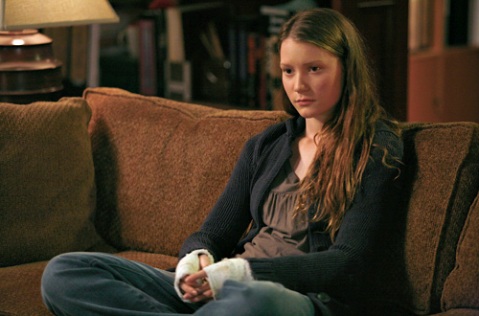
Yet I’ve been putting some muscle into coming up with a similar list of remarkable young female actors who play smart onscreen and it’s really hard. Not hard for older women, mind you; as a culture we seem perfectly willing to grant brains to women over 35 (witness Helen Mirren, Holly Hunter, Tilda Swinton, Charlotte Rampling, Frances McDormand, Judy Davis …). The one vivid exeption to the rule is Mia Wasikowska (above), she of that remarkable 1st season of In Treatment, Alice in Wonderland, as the teenaged daughter in The Kids are All Right, and the upcoming Jane Eyre. Other than that? Can you think of a single young actor who plays smart onscreen from one role to the next?
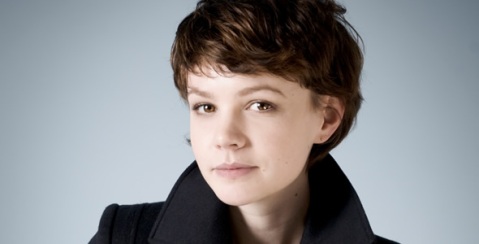
I can’t. As much as I loved the fast-talking smarts of Carey Mulligan in An Education and Emma Stone in Easy A this year, there’s one thing that ruins those tales for me: ultimately these smart characters are shown to be dumb when it comes to men and sex (respectively). Get it? Smart girls aren’t smart about everything. I can think of a couple of one-off performances this year — Jennifer Lawrence in Winter’s Bone and Noomi Rapace in the Girl With the Dragon Tattoo franchise, but I have yet to be convinced that these actors can translate one excellent part into the kinds of careers that New York Magazine‘s favorite young men have achieved. Consider the career of Harvard grad Natalie Portman, who’s now getting close to 30 (and therefore into the age range wherein Hollywood allows women to be brilliant) — has she ever played smart onscreen? And don’t even get me started on the fact that the last time I saw a smart young Latina, Asian, Native American, or black woman onscreen was Shareeka Epps in Half Nelson (2006) — and where have the roles gone for Epps in the meantime?
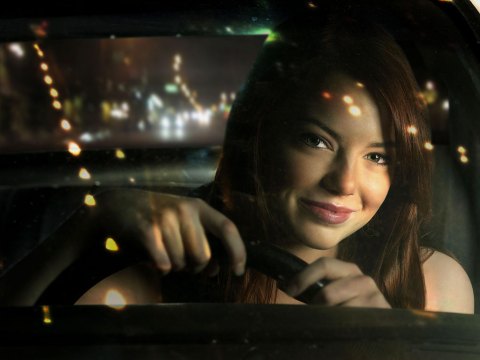
If any of you doubts the perversity of this trend, consider one of the prevailing cultural anxieties appearing in major media of the past six months: the idea that boys are falling behind girls (or, in Hanna Rosin’s trademark hysterical terms, THE END OF MEN). At the same time that we watch smart boys and hot girls onscreen, we’re also supposed to feel anxious about the fact that girls do better in school and young women are going to college in vastly larger numbers than boys (they make up roughly 60% of college populations). This has prompted Rosin and her ilk to proclaim that women are “winning” some kind of battle against men. Thus, the fact that our films persist in peddling some kind of retro fantasy about boys’ smartness seems to reject our anxieties that girls might be pretty and smart, and reassures us that smart dudes will always bag the hotties.
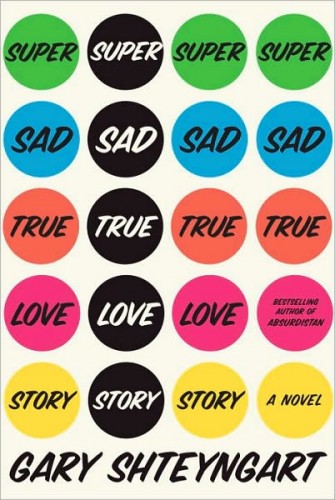
If you need an explanation for my bleak mood, it’s because I just finished reading Gary Shteyngart’s incredibly disturbing dystopian novel, Super Sad True Love Story. In this America of the future, women wear clothes made by the JuicyPussy brand, Total Surrender panties (which pop off at the push of a little button), and have their hotness level perpetually broadcast to everyone around them via a version of a smartphone called an äpparät. It’s a brilliant characterization of the future (I cringed and laughed at the fact that the hero’s love interest, Eunice Park, majored in Images and minored in Assertiveness in college — we all know that’s where we’re heading) but ultimately one that reiterates that tired trope: shlubby, bookish, imperfect, aging hero falls for very beautiful, very young, very anti-intellectual woman — and wins her, at least for a while. You know what? I love shlubby men in real life (hi, honey!), but I have grown to despise their perpetual appearance in narratives.
So to cleanse my palate of the oily aftertaste of Super Sad,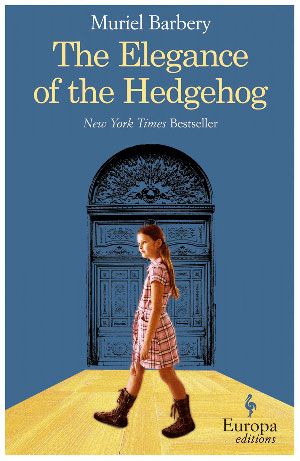 I’ve plunged myself into Muriel Barbery’s wonderful novel, The Elegance of the Hedgehog, which moves back and forth between the interior monologues of two brilliant women: the autodidact Renée, who hides behind her mask as an unkempt, sullen concierge in an elegant Paris apartment building; and Paloma, the precociously intelligent 12-year-old who lives upstairs and despises the pretentions of her family, teachers, and classmates. They seem to be on a path to discover one another — but I’m at the point in the novel when I’m so enjoying just listening to them think out loud that I’m not sure I care whether the narrative goes anywhere (Paloma has a diatribe about why grammar is about accessing the beauty of language that’s so wonderful I’m thinking of plagiarizing it for use in my classes).
I’ve plunged myself into Muriel Barbery’s wonderful novel, The Elegance of the Hedgehog, which moves back and forth between the interior monologues of two brilliant women: the autodidact Renée, who hides behind her mask as an unkempt, sullen concierge in an elegant Paris apartment building; and Paloma, the precociously intelligent 12-year-old who lives upstairs and despises the pretentions of her family, teachers, and classmates. They seem to be on a path to discover one another — but I’m at the point in the novel when I’m so enjoying just listening to them think out loud that I’m not sure I care whether the narrative goes anywhere (Paloma has a diatribe about why grammar is about accessing the beauty of language that’s so wonderful I’m thinking of plagiarizing it for use in my classes).
Here’s what it would take to cultivate a generation of young actresses known for their braininess:
- Just jettison the smart vs. hot binary for women onscreen already. If I see glasses used as the “smart” signifier one more time…
- Write some stories in which young women aren’t just interested in dudes all the time, but have wholly stand-alone loves of language, art, math, con artistry, biology, music, sports, comic books, religion, killing demons, other girls, or food — even drugs or booze, for gods’ sake — just like actual women.
- Stop resigning smart girls to the sidekick position in kids’ films like Harry Potter, Cloudy With a Chance of Meatballs, and TV shows like Buffy, etc.
- Show that smartness isn’t just a magical quality endowed by nature, but is something that takes work.
- Show that smartness can pose a problem beyond scaring off potential dudes — when young women face idiotic, paternalistic bosses, teachers too tired to teach to the top 1% of a class, or families in which no one has ever gone to college.
- Let girls play brilliant anti-heroes along the lines of Jesse Eisenberg’s take on Mark Zuckerberg — or, hell, just weird antisocial types like Lisbeth Salander.
- Let girls play funny.
- Let young female actors fail occasionally in a part the way we just keep forgiving failures by Jonah Hill, Zach Galifianakis, Ashton Kutcher, even Robert Downey, Jr. — the list goes on — without career consequences.
- Give me a central female character besides The Girl With the Dragon Tattoo who’s a computer whiz.
- Display explicitly feminist characters onscreen, and have them explain their opinions.
Maybe then we won’t experience that odd whiplash of suddenly having our actresses arrive at the age of 35 and suddenly become smart (does this read as unattractive and/or ball-busting to male viewers, I wonder?). I, for one, am looking forward to my movies looking a bit more like reality.
Filed in 2000s films, 2010s films, An Education, Carey Mulligan, Easy A, Emma Stone, female ambition, Gary Shteyngart, gender gap, Girl Who Kicked the Hornet's Nest, Girl Who Played with Fire, Girl with the Dragon Tattoo, Half Nelson, Hanna Rosin, Helen Mirren, Holly Hunter, Jennifer Lawrence, Jesse Eisenberg, Jodie Foster, Mia Wasikowska, Movies & books you need to know (and probably don't), Muriel Barbery, Natalie Portman, Noomi Rapace, Shareeka Epps, The curious case of women in film, Tilda Swinton, Why feminism matters now, Winter's Bone
Tags: An Education, Carey Mulligan, Easy A, Emma Stone, Gary Shteyngart, Girl with the Dragon Tattoo, In Treatment, Jennifer Lawrence, Jodie Foster, Mia Wasikowska, Muriel Barbery, Natalie Portman, Noomi Rapace, Shareeka Epps, Super Sad True Love Story, The Elegance of the Hedgehog, Winter's Bone




